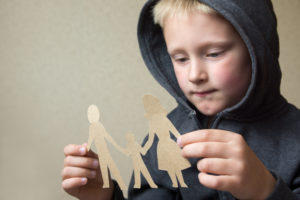Separation or divorce of parents is a devastating time for an entire family. Children are particularly vulnerable to the stresses of anger, arguments, loss and change. During this time of stress, children need understanding, calm connecting time with both parents, and reassurance of continued loving relationships. Here are some ways to minimize the stress and grief of separation or divorce in the family for children:
Children of divorced families have a higher risk of difficulties coping later in life, including school-related issues, drug use, and relationship difficulties. The biggest risks for children occur when the child’s economic situation deteriorates, when one parent abandons the child or doesn’t stay in close contact, when parents keep fighting, when one or both parents “fall apart” and stop being responsible parents, and when a new step-parent is harsh, rejecting or abusive.
The good news is, children living with one parent report feeling just as happy as those living with two. Divorce is stressful, but does not have to have a damaging impact; there are ways to prevent the risk to children that divorce can bring.
- Make your child’s emotional health your first priority. Making sure your child is coping well is the most important goal you can have in your divorce. It will focus you on the job of parenting. Make a plan with your ex to keep your child’s emotional health the first priority in the divorce. If you can both agree to this, it will decrease tension and focus both of you on a higher goal.
- Sit down and talk to your child calmly and clearly about the divorce. Let them know you’ve done everything you could to save the marriage, but that it’s better for everyone to make this change. Reassure your child that both parents still love him/her, and always will. Reassure your child they are not responsible for the divorce.
- Maintain family rules, routines, schedules and structures. This will decrease stress for your child and will help him/her feel reassured about the future and their place in it.
- Maintain adult boundaries with your child. Do not allow your child to become a surrogate spouse or friend to you after the divorce. Remember that they are your child and you are their parent – it is your job to keep their environment as safe, non-toxic and age appropriate as possible. Take the high road – every time. You will feel challenged and pushed to your limit, but do not respond negatively about the divorce in front of your child. Always put their need for peace and love from both parents above your need for venting or revenge. Don’t fight with your ex in front of your child. Don’t talk about your ex in front of your child. Keep your child out of your relationship with your ex. Do not have your child relay messages or ask questions about your ex for you. Don’t pump your child for information about your ex’s life.
- Don’t make your child choose between parents. Encourage your child to love you and your ex both. Encourage them to feel positive about the other parent – however they feel about their parents is what they will internalize about themselves.
- Help your child feel at home and attached to both homes. Remember the stress your child feels going from one home to another. Ease the transition from home to home.
- Let your child have his/her feelings about the divorce. Listen and help your child understand his/her feelings about the divorce. Sit down and play with them, allowing them to express their feelings or conflicts in play.
- Model for your child maturity through the change in relationship. Try to avoid a conflictual approach but instead opt for consensual solutions. The problem solving strategies we expect our children to use on the playground are the same we need to use as adults: communicating calmly and respectfully to find a fair solution for everyone.
Consider counselling to help you find your centre and stay focused on the happiness and well-being of your family. Staying positive is important, but not being negative is even more important for the health of your child. You may need help learning how to let go of anger and negativity, to develop strategies to deal with frustration, grief and stress. Learning to stay aware of your needs, to be calm and connected with your child no matter what else is happening in your life is possible, with help.

